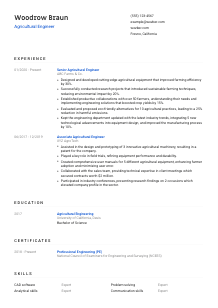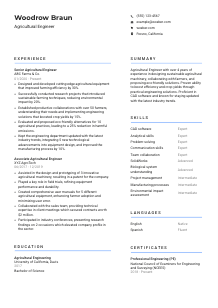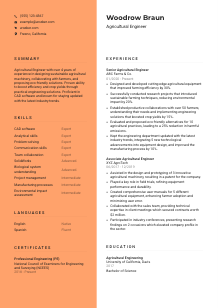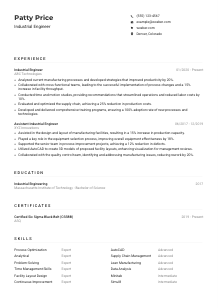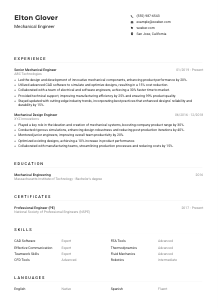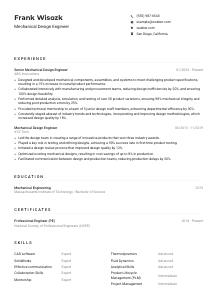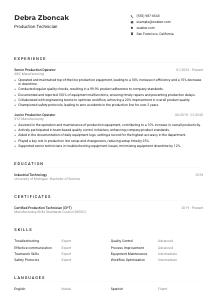Agricultural Engineer Resume Example
Designing efficient farmland, but your resume seems overgrown? Cultivate ideas from this Agricultural Engineer resume example, spruced up using Wozber free resume builder. Experience how seamlessly you can align your farming innovations to meet job requirements, and watch your career harvest bountiful opportunities!
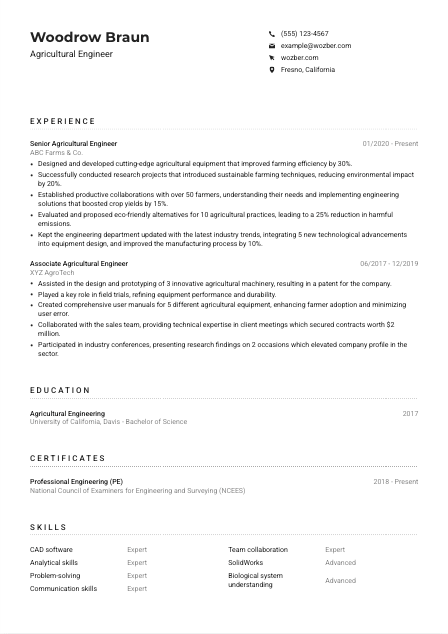
How to write an Agricultural Engineer resume?
Embarking on the journey to land your dream role as an Agricultural Engineer begins with one critical tool: your resume. This isn't merely a document; it's the blueprint of your professional life, designed to impress and persuade. With Wozber, you're about to navigate the complexities of aligning your resume with the specific cadence and requirements of an Agricultural Engineer position.
Dive into a transformative experience where we refine your resume into an ATS-compliant masterpiece, capable of catching the eye of hiring managers and systems alike. Let's cultivate the fields of opportunity together!
Personal Details
In the vast landscape of job applications, first impressions are paramount. Elevating your Agricultural Engineer resume begins with personal details tailored to echo professionalism and alignment with the role. Let's delve into how Wozber's free resume builder enables you to set a strong foundation.
1. Brand Yourself with Confidence
Your name is more than an identifier; it's the banner under which your qualifications march. Ensure it's presented boldly, setting the stage for the narrative of your capabilities and aspirations as an Agricultural Engineer.
2. Match the Job Title Precision
Directly beneath your name, position the role you're targeting - "Agricultural Engineer". This explicit alignment with the job description signals relevance at first glance, reinforcing your candidacy's focus.
3. Ensure Accessibility Through Contact
Your contact information - phone number and a professional email (think firstname.lastname@gmail.com) - are bridges enabling potential employers to reach out. Accuracy here is paramount; a misspelled email or wrong number could cost you opportunities.
4. Geographical Alignment
"Located in or willing to relocate to Fresno, California", as stated in the job description, should be mirrored in your contact information. This reflects your readiness and eliminates any location-based hesitations from the employer's perspective.
5. A Dot of Professional Online Presence
Where applicable, including a link to a professional profile or personal website (if it showcases relevant projects or achievements) could provide a rich, expanded view of your professional landscape.
Takeaway
The personal details section is akin to the opening notes in a symphony, setting the tone for what follows. Elevate this section with precision and professionalism, ensuring that each element resonates with your Agricultural Engineer role.





Experience
A well-crafted experience section is your showcase, displaying your journey, achievements, and the value you're set to bring as an Agricultural Engineer. With Wozber's guidance, let's sculpt this section to resonate vibrantly with your targeted role.
- Designed and developed cutting‑edge agricultural equipment that improved farming efficiency by 30%.
- Successfully conducted research projects that introduced sustainable farming techniques, reducing environmental impact by 20%.
- Established productive collaborations with over 50 farmers, understanding their needs and implementing engineering solutions that boosted crop yields by 15%.
- Evaluated and proposed eco‑friendly alternatives for 10 agricultural practices, leading to a 25% reduction in harmful emissions.
- Kept the engineering department updated with the latest industry trends, integrating 5 new technological advancements into equipment design, and improved the manufacturing process by 10%.
- Assisted in the design and prototyping of 3 innovative agricultural machinery, resulting in a patent for the company.
- Played a key role in field trials, refining equipment performance and durability.
- Created comprehensive user manuals for 5 different agricultural equipment, enhancing farmer adoption and minimizing user error.
- Collaborated with the sales team, providing technical expertise in client meetings which secured contracts worth $2 million.
- Participated in industry conferences, presenting research findings on 2 occasions which elevated company profile in the sector.
1. Decode the Job Specifications
Start by meticulously reviewing the job description, highlighting keywords and phrases that describe the responsibilities and experiences sought after. This step ensures that your resume speaks directly to the needs of the role.
2. Present Your Professional Journey
List your roles in reverse chronological order, emphasizing positions and projects that reflect your proficiency in agricultural engineering, from CAD software skills to the development of sustainable agricultural machinery.
3. Quantify Your Agricultural Impact
Where possible, bolster your achievements with numbers. Did your innovations in agricultural equipment enhance farming efficiency? By how much? Quantifiable impacts offer concrete proof of your capabilities.
4. Relevance is Key
Focus solely on experiences that align with the Agricultural Engineer role. While being a multifaceted professional is valuable, your resume should act as a laser-focused narrative showcasing your fit for the position.
5. Echo the Job Description
Reflect language from the job description in your accomplishments. This not only aids in ATS optimization but also directly ties your experiences to the needs of the employer.
Takeaway
This section is the core of your resume, where each achievement you list is a seed planted for future discussions. Craft it with care, ensuring it's tailored, quantifiable, and directly correlating with the Agricultural Engineer role.
Education
Education forms the bedrock of your expertise as an Agricultural Engineer. Here's how to ensure this section supports your candidacy, providing a glimpse into your technical foundation and dedication to the field.
1. Highlight Relevant Degree
Ensure your degree aligns with the job description. For the Agricultural Engineer role, a 'Bachelor's degree in Agricultural Engineering' mirrors the specified requirements, establishing a direct link between your qualifications and job expectations.
2. Keep It Crisp and Clear
List your academic achievements in a straightforward format: degree, field, institution, and graduation date. Clarity here sets the stage for a smooth sail through both ATS and human scrutiny.
3. Tailor Degree Specifics
When your degree directly corresponds with the job description, it's like fitting a key into a lock. This perfect alignment opens doors and sets you apart in a field competitive as Agricultural Engineering.
4. Feature Relevant Courses or Projects
If early in your career or if specific courses/projects you've undertaken are remarkably relevant, do not hesitate to list them. This shows initiative and dedication to your field of expertise.
5. Additional Academic Honors
Particularly for roles that require meticulous precision and innovation, such as an Agricultural Engineer, indicating any honors or recognitions can bolster your resume, showcasing your commitment and excellence in the field.
Takeaway
Your educational background is a testament to your dedication and expertise within agricultural engineering. Tailored correctly, it not only meets but surpasses expectations, offering a solid foundation for your candidacy.
Certificates
In the ever-evolving field of agricultural engineering, staying ahead with up-to-date certifications can significantly elevate your resume. Let's explore how to strategically present your certificates.
1. Highlight Required Certifications
The job description might hint at preferred certifications, such as 'Certification in Professional Engineering (PE)'. Prioritize these in your resume to meet the explicit demands of the position.
2. Selective Representation
Instead of listing every certificate you've ever earned, choose those that add value to your Agricultural Engineer application. This focus ensures the spotlight remains on your most relevant qualifications.
3. Date Your Achievements
Including the acquisition or expiry dates of your certifications can show your commitment to staying current in your field, an invaluable trait in the rapidly innovating agricultural sector.
4. Embrace Continuous Learning
In a field as dynamic as agriculture, ongoing education is key. Regularly updating your certificates not only keeps you competitive; it demonstrates a dedication to growth and adaptation.
Takeaway
Your certificates are a testament to your commitment to professional development. Choosing wisely and presenting them effectively on your resume aligns your trajectory with the advancements in agricultural engineering.
Skills
The skills section of your resume is where you get to shine a light on the tools of your trade. For an Agricultural Engineer, this goes beyond software proficiency, embracing analytical prowess and innovative thinking.
1. Extract From the Job Description
Pinpoint both the hard and soft skills the job ad specifies. These are your keywords, your secret sauce for ATS optimization and for capturing the hiring manager's attention.
2. Match and Showcase
For each skill listed in the job description, match it with your proficiency level. Whether it's "Expert" in CAD software or "Advanced" understanding of biological systems, make sure it's clearly indicated.
3. Prioritize With Precision
Resist the temptation to list every skill under the sun. Focus on the most relevant to your role as an Agricultural Engineer, ensuring a crisp, reader-friendly presentation that captivates rather than overwhelms.
Takeaway
Skills, both innate and acquired, are your professional signature. Displaying them with confidence and clarity on your resume assures potential employers of your proficiency and alignment with the Agricultural Engineer role.
Languages
In the field of agricultural engineering, where global collaborations and diverse teams are common, your linguistic skills can be the bridge to unprecedented opportunities. Let's articulate how best to present this asset.
1. Prioritize as Per Job Description
The call for 'English language competency' signals its non-negotiable status. List it prominently, with an honest appraisal of your proficiency, to satisfy this fundamental requirement.
2. Additional Languages as Bonus
While the job may not explicitly demand it, additional languages signal your preparedness for global engagement, a noteworthy trait for an Agricultural Engineer eyeing opportunities beyond the local sphere.
3. Be Candid About Proficiency
From 'Native' to 'Basic', your level of expertise in each language should be transparent. This honesty ensures expectations are matched and appreciated.
4. Every Language Counts
Don't underestimate the value of each language you speak. Even 'Basic' proficiency can open doors, especially in roles that engage with diverse populations or international stakeholders.
5. Global Perspective
Your linguistic skills reflect not just communication ability but the readiness to navigate and thrive in varied cultural landscapes. Highlighting this aptitude can distinguish you in the field of agricultural engineering.
Takeaway
Languages are more than tools for communication; they are lenses through which we understand the world. As an aspiring Agricultural Engineer, showcasing this skill set enriches your profile, offering a glimpse into your global readiness.
Summary
Your resume summary is the concise narrative of your professional journey, tailored to the Agricultural Engineer position. It's the hook that reels in the reader, compelling them to dive deeper into your story.
1. Absorb the Job's Core
Begin by internalizing the essence of the Agricultural Engineer role. What challenges does it present? What solutions can you offer? This insight forms the backbone of your summary.
2. Start with Strength
Introduce yourself through the kaleidoscope of your profession: an experienced and innovative Agricultural Engineer, proficient in designing sustainable solutions and conversant with the latest technologies.
3. Mirror the Role's Language
Incorporate terminology and phrases from the job description, seamlessly weaving your qualifications with the employer's needs. This alignment spotlights your relevance and preparedness.
4. Conciseness is Key
A potent summary is both pointed and potent, inviting the reader to explore further without overloading them with details. In three to five lines, encapsulate your journey, achievements, and the value you promise to bring.
Takeaway
The summary isn't just an introduction; it's an invitation to a conversation. Craft a compelling narrative that leaves no doubt about your suitability for the Agricultural Engineer role. It's your story; make it resonate.
Your Blueprint for Success
As we conclude this guide, remember that your resume is the starting point of your journey as an Agricultural Engineer. With Wozber's ATS-friendly resume templates and ATS resume scanner, you're equipped to navigate the recruitment landscape successfully, ensuring your resume not only meets but exceeds the mark. Your aspirations as an Agricultural Engineer are valid and achievable. Take these insights, harness the power of Wozber, and step confidently into a future rich with opportunity. The field awaits your expertise.

- Bachelor's degree in Agricultural Engineering, Biological Systems Engineering, or a related field.
- Minimum of 3 years of experience in agricultural design and machinery.
- Proficiency in CAD software and other engineering tools.
- Strong analytical, problem-solving, and communication skills.
- Certification in Professional Engineering (PE) if commonly listed in job ads.
- English language competency is a must.
- Must be located in or willing to relocate to Fresno, California.
- Design and develop agricultural machinery, equipment, and structures to optimize efficiency and sustainability.
- Conduct research to solve complex agricultural problems and improve farming techniques.
- Collaborate with farmers and stakeholders to understand their needs and provide practical engineering solutions.
- Evaluate the environmental impact of agricultural activities and propose eco-friendly alternatives.
- Stay updated with industry trends, new technologies, and government regulations to ensure compliance and innovation.





